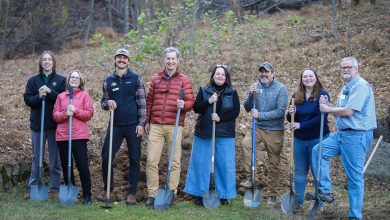Last Updated on February 12, 2022 6:40 pm
RALEIGH – The N.C. Bioenergy Research Initiative recently awarded $1 million in grants for 13 research projects to boost bioenergy opportunities and production in the state.
“These grants continue to push our knowledge of bioenergy applications in North Carolina forward, creating the potential for future market opportunities for farmers, agribusinesses and forestry industries,” said Agriculture Commissioner Steve Troxler.
Below is a list of grant amounts, recipients and projects:
- $97,231 to Appalachian State University’s Department of Sustainable Technology and the Built Environment for the project “Demonstrating Syngas Production from Bioenergy Crops.” This project builds on previously funded work that developed methods of heating greenhouses with biomass. The next focus will be using biomass grown on-site to produce syngas for heating as well as biochar as a soil amendment for the biomass production.
- $43,618 to N.C. State University’s Department of Biological and Agricultural Engineering for the third year of its study of fertilization rates and yield response of the giant reed Arundo donax. The project will focus on collecting field data needed to establish realistic yield expectations and nitrogen fertilization rates under various North Carolina growing conditions.
- $55,835 to the NCSU Department of Forestry and Environmental Resources for “Loblolly Pine Biomass Genetics/Cropping Study – 2016-2017.” The project will continue genetic evaluation of loblolly pine varieties with high potential as an energy source.
- $148,804 to the NCSU Department of Crop and Soil Sciences for a project titled “Nutrient Dynamics and Production of Bioenergy Crops in Swine Effluent Sprayfields, 2016-2017.” Funding will continue research on the nutrient requirements and uptake of proposed biomass crops grown in a sprayfield environment.
- $148,650 to Carolina Land & Lakes RC&D for the development of “Pellets for Pullets.” This expands a previously funded project into areas of the state with a higher concentration of broiler production. Wood pellet heating systems have been shown to offer cost savings, reduction in moisture and fossil fuel by-products and delivery of a better product to market, while utilizing a renewable domestic fuel.
- $30,167 to the NCSU Department of Crop and Soil Sciences for the second year of the study “Suitability of N.C. Piedmont Soils for Bioenergy Crop Production.” The project investigates the potential conversion of land to bioenergy crops with an emphasis on how soil biochemical and physical properties will be impacted.
- $50,000 to Power Resource Group LLC for a project titled “Crops to Litter to Fuel.” Combinations of giant miscanthus, biochar and pine shavings will be tested against traditional pine shaving litter in turkey brooder houses. Spent litter will be tested to see if it can successfully serve as a high-BTU feedstock for combined heat and power production.
- $32,213 to the NCSU Department of Crop and Soil Sciences for the first year of a two-year project titled “Weed Management in Miscanthus and Switchgrass Bioenergy Cropping Systems.” This builds on a previously funded herbicide project, but will focus more on weed management while establishing giant miscanthus and switchgrass, two potential bioenergy feedstock crops.
- $103,470 for the first year of a three-year project titled “Predicting Short Rotation Woody Crops Productivity and Economic Feasibility.” This collaborative effort between the NCSU Department of Forestry and Environmental Resources and N.C. A&T State University’s Department of Economics will use previously funded projects to refine and validate a forest productivity and economic model. This model will facilitate stakeholder decision-making for short rotational woody crop production and procurement as well as provide best land management practices to landowners via a web-based interactive tool.
- $147,851 to the NCSU Department of Horticultural Science for the project “Gene Editing for Improved Energy Canes.” This project will build on previously funded projects focused on breeding high biomass, cold hardy hybrids. Efforts will now focus on refining regeneration systems and the development of gene-editing technologies for the development of seedless cultivars.
- $24,818 to Tyton Biosciences LLC for the project titled “Energy Tobacco Variety and Sprayfield Trials.” In partnership with NCSU, Tyton will build on results from its previous energy tobacco work by conducting variety trials of modified energy tobacco to maximize biomass yield and evaluate hardiness and other plant characteristic. Work will also include testing energy tobacco in a sprayfield environment to determine nutrient uptake.
- $58,004 to the NCSU Department of Crop and Soil Sciences for “Developing Industrial Hemp in North Carolina.” This work will investigate the feasibility of industrial hemp for food, fiber and fuel by evaluating varieties and developing best management practices such as planting dates and response to plant growth regulators.
- $59,339 to the NCSU Department of Forestry and Environmental Resources for year one of a project titled “Loblolly Pine Plantations to Maximize Bioenergy Production.” This two-year project builds on previously funded work and will utilize two established experimental stands of loblolly pine. Results from this novel design will provide a better understanding of superior genotypes, crown forms, spacing and silviculture practices to optimize loblolly pine for bioenergy production.
The N.C. Bioenergy Research Initiative is a program of the N.C. Department of Agriculture and Consumer Services. Its goal is to support the research and development of agricultural and forestry-based feedstocks for bioenergy production and agribusiness development. The N.C. General Assembly approved funding for grants to stimulate energy production from N.C. agricultural and forest products.


















